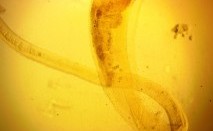
Category: Invertebrates
“Clam” is an informal name that refers to bivalves (such as oysters, scallops, mussels, cockles, clams, and numerous other families that can live in both fresh and saltwater environments. Most are filter feeders and have a shell consisting of two calcareous halves attached via a flexible ligament along a hinge line. Most are sedentary but some bivalves, such as scallops, are able to “swim” by opening and closing their valves rapidly. There are around 9200 named species of living bivalves and accompanying such a large number is an amazing diversity of forms, behavior, and other adaptations. Bivalves have historically been a very important part of the diet of coastal human populations.

Rub some dirt on it!
Could it be we have been too good at ridding our bodies of parasitic worms? Believe it or not, our efforts at keeping squeaky-clean and sanitary in the developed world may be contributing to increased allergies, asthma, psoriasis, even autoimmune diseases. The human immune system, having evolved with parasitic worms, recognizes them, and has learned to reduce inflammation and stimulate healing when these tiny intruders are sensed. While getting worms may be seen as too high a price to pay for many, for people suffering from severe allergies or colitis, it may be worth it. Victims of multiple sclerosis and Crohn’s disease have shown a promising reduction in symptoms (even remission in Crohn’s) after ingesting whipworm eggs - a treatment that may be worth it to some until a cure is found!
Learn more >>
 Discover Animals is a web-based educational resource offered by the NAIA
Discover Animals is a web-based educational resource offered by the NAIA